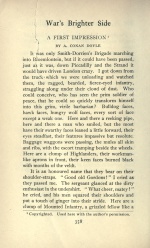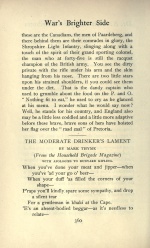A First Impression

(in War's Brighter Side, D. Appleton & Co., 1901, p. 350)
A First Impression is an article written by Arthur Conan Doyle first published in Friend on 6 april 1900.
Editions
- in Friend (6 april 1900 [ZA])
- extract in Daily Mail (10 april 1900 [UK])
- extract in Westminster Gazette (10 april 1900 [UK])
- extract in Farnham, Haslemere and Hindhead Herald (14 april 1900 [UK])
- in War's Brighter Side (april 1901, C. Arthur Pearson Ltd. [UK])
- in War's Brighter Side (1901, D. Appleton & Co. [US])
A First Impression



It was only Smith-Dorrien's Brigade marching into Bloemfontein, but if it could have been passed, just as it was, down Piccadilly and the Strand it would have driven London crazy. I got down from the truck, which we were unloading and watched them, the ragged, bearded, fierce-eyed infantry, straggling along under their cloud of dust. Who could conceive, who has seen the prim soldier of peace, that he could so quickly transform himself into this grim, virile barbarian? Bulldog faces, hawk faces, hungry wolf faces, every sort of face except a weak one. Here and there a reeking pipe, here and there a man who smiled, but the most have their swarthy faces leaned a little forward, their eyes steadfast, their features impassive but resolute. Baggage waggons were passing, the mules all skin and ribs, with the escort tramping beside the wheels. Here are a clump of Highlanders, their workman-like aprons in front, their keen faces burned black with months of the veldt.
It is an honoured name that they bear on their shoulder-straps. "Good old Gordons!" I cried as they passed me. The sergeant glanced at the dirty enthusiast in the undershirt. "What cheer, matey!" he cried, and his men squared their shoulders and put a touch of ginger into their stride. Here are a clump of Mounted Infantry, a grizzled fellow like a fierce old eagle at the head of them. Some are maned like lions, some have young, keen faces, but all leave an impression of familiarity upon me. And yet I have not seen irregular British cavalry before. Why should I be so familiar with this loose-limbed, head-erect, swaggering type ; of course it is the American cow-boy over again. Strange that a few months of the veldt has produced exactly the same man that springs from the western prairie. But these men are warriors in the midst of war. Their eyes are hard and quick. They have the gaunt, intent look of men who live always under the shadow of danger. What splendid fellows there are among them!
Here is one who hails me ; the last time I saw him we put on seventy runs together when they were rather badly needed, and here we are, partners in quite another game. Here is a man of fortune, young, handsome, the world at his feet, he comes out and throws himself into the thick of it. He is a great heavy-game shot, and has brought two other "dangerous men" out with him. Next him is an East London farmer, next him a fighting tea-planter of Ceylon, next him a sporting baronet, next him a journalist, next him a cricketer, whose name is a household word. Those are the men who press into the skirmish-line of England's battle.
And here are other men again, taller and sturdier than infantry of the line, grim, solid men, as straight as poplars. There is a maple-leaf, I think, upon their shoulder straps, and a British brigade is glad enough to have those maples beside them. For these are the Canadians, the men of Paardeberg, and there behind them are their comrades in glory, the Shropshire Light Infantry, slinging along with a touch of the spirit of their grand sporting colonel, the man who at forty-five is still the racquet champion of the British army. You see the dirty private with the rifle under his arm and the skin hanging from his nose. There are two little stars upon his strained shoulders, if you could see them under the dirt. That is the dandy captain who used to grumble about the food on the P. and O. "Nothing fit to eat," he used to cry as he glanced at his menu. I wonder what he would say now ? Well, he stands for his country, and England also may be a little less coddled and a little more adaptive before these brave, brave sons of hers have hoisted her flag over the "raad zaal" of Pretoria.